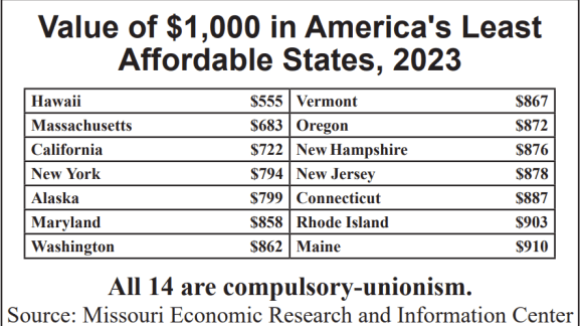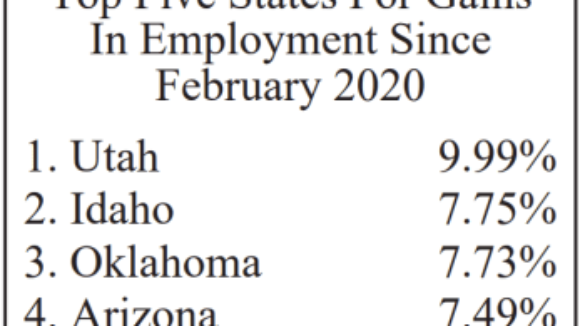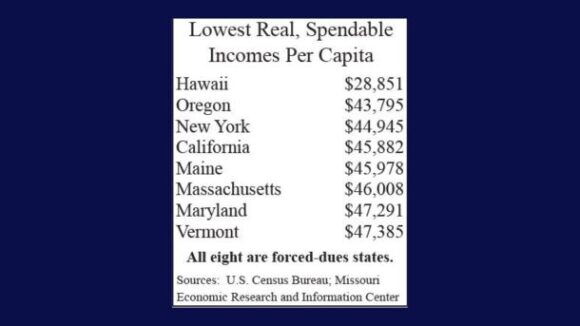Banning Compulsory Dues Curbs Cost of Living
On average, forced-unionism states are 23.2% more expensive to live in than Right to Work states. And decades of academic research show that compulsory unionism actually fosters a higher cost of living.
Deep in the heart of UAW country, Nolan Finley, the editorial page editor of the Detroit News, proposes a radical change to bolster Michigan’s sagging economy — turn Michigan into a Right to Work state.
The article is certainly worth reprinting:
Michigan needs a big play. We need to send up a signal flare that announces the state’s culture has radically changed.
Ideally, we’d do it by forging the nation’s most competitive tax system. Or creating the most highly skilled work force. Or being boldly innovative by, say, guaranteeing health care costs won’t rise faster than inflation.
But those things will take more time than we have.
Something we can do quickly, and with more dramatic impact is to make Michigan a right-to-work state.
Ending compulsory union membership in the birthplace of the United Auto Workers and the sentimental home of the Teamsters would send a powerful message that Michigan is ready to move into the 21st century.
And it would knock down a major obstacle to attracting investment.
Michigan has a well-earned reputation as being in the iron grasp of Big Labor. Businesses that have a choice won’t come to a state where the politics and policy are dictated by union bosses.
Conventional wisdom says that labor’s influence is too powerful to even consider a right-to-work movement in Michigan.
But increasingly, the right-to-work option is finding its way into serious conversations about what it will take to stop the state’s economic freefall.
Barely 20 percent of Michigan workers belong to a labor union, down from 26 percent in 1989, and the rate is still falling. While labor controls the politicians, its influence with voters is waning.
I’d bet that if a right-to-work proposal made it on the ballot in 2008, it would stand a fighting chance of passing.
Free states prosper
Much of the nation’s growth is coming from the 22 right-to-work states. Those states saw a 20 percent jump in employment between 1995 and 2005, compared with 11 percent for states that compel union membership.
Right-to-work states are attracting the best-paying jobs, posting a 37 percent gain in household income during that period, compared with 26 percent elsewhere.
In metropolitan areas, residents of right-to-work states enjoy the fattest paychecks.
Foreign automakers and suppliers are putting most of their manufacturing facilities in right-to-work states, and paying workers wages and benefits comparable with the Big Three’s union plants.
The UAW’s inability to organize transplant facilities is evidence that manufacturing workers can get along just fine without a union standing between them and their employer.
The Democratic-controlled Congress is battling for legislation to allow unions to organize workers without a secret-ballot election.
If that ever becomes law, it will make Michigan an even more dangerous place for companies that would rather not risk the added costs and inefficiencies a union brings.
Big Labor survives today in a few, isolated strongholds only because its political pals tilt the playing field in its favor.
Michigan is one of those labor bastions, protecting an obsolete institution while cheating its citizens of opportunity.

On average, forced-unionism states are 23.2% more expensive to live in than Right to Work states. And decades of academic research show that compulsory unionism actually fosters a higher cost of living.

Strong employment gains in Right to Work states are the reason more Americans are working now than pre-COVID.

Where forced union dues are permitted, workers and other people end up with less purchasing power.